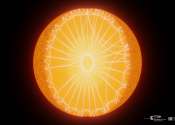What can AI learn about the universe?
Artificial intelligence and machine learning have become ubiquitous, with applications ranging from data analysis, cybersecurity, pharmaceutical development, music composition, and artistic renderings.

Artificial intelligence and machine learning have become ubiquitous, with applications ranging from data analysis, cybersecurity, pharmaceutical development, music composition, and artistic renderings.
Astronomy
May 3, 2024
0
29

Bayreuth researchers shed light on the natural evidence for the occurrence and function of networks of fungi and plants—so-called mycorrhizal networks. Through this "Wood Wide Web," plants can exchange resources and even ...
Plants & Animals
Apr 19, 2024
0
39

At a distance of 11.9 light years, Epsilon Indi (ε Indi) is an orange dwarf star (also known as a K dwarf) with 71% of the sun's diameter. An international team, led by Instituto de Astrofísica e Ciências do Espaço (IA) ...
Astronomy
Mar 26, 2024
0
39

An international team, including Western astrophysicists Els Peeters and Jan Cami, has found the destruction and re-formation of a large quantity of water in a planet-forming disk located at the heart of the Orion Nebula.
Astronomy
Feb 23, 2024
0
196

An international scientific team including more than 40 authors from seven different countries, led by a researcher at the University of Malaga Juan Pascual Anaya, has managed to sequence the first genome of the myxini, also ...
Evolution
Jan 12, 2024
0
273

World leaders are gearing up for COP28, an annual U.N. climate conference that will begin this week in Dubai, and California is expected to play a sizable role in the proceedings.
Environment
Nov 30, 2023
1
9

The "Healthy Crops" international research consortium led by Professor Dr. Wolf B. Frommer from Heinrich Heine University Düsseldorf (HHU) is developing disease-resistant rice varieties. In eLife, the authors now report ...
Biotechnology
Jun 20, 2023
0
14

In the 1960s, astronomers began noticing a pervasive microwave background visible in all directions. Thereafter known as the Cosmic Microwave Background (CMB), the existence of this relic radiation confirmed the Big Bang ...
Astronomy
Apr 21, 2023
9
185

Jülich researchers have been able to demonstrate an exotic electronic state, so-called Fermi Arcs, for the first time in a 2D material. The surprising appearance of Fermi arcs in such a material provides a link between novel ...
Condensed Matter
Sep 26, 2022
0
185

Squeaky, cloudy or spherical—electron orbitals show where and how electrons move around atomic nuclei and molecules. In modern chemistry and physics, they have proven to be a useful model for quantum mechanical description ...
General Physics
Sep 5, 2022
0
533